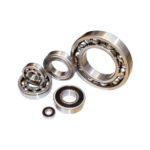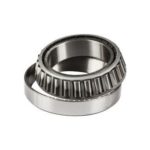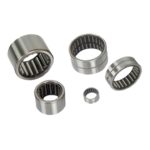Gestión de Compras produce and supply bushings and bearings from different types and different standards in a wide range of materials.
Product
Bearings and bushings are machinery components that consist on a support, guide, or locating piece for a rotating oscillating, or sliding mechanical part. Their main function is improve efficiency, accuracy, service intervals, reliability and speed of operation thereby reducing costs of purchasing and operating machinery. These components depending of his design can resist thrust loading, radial loading, or a combination of both.
Exist two principal types of bearings: frictional bearing and roller bearing.
Frictional bearing
also called bushing, plain bearings or sleeve bearings. It’s a type of bearing where the sliding motion occurs between the moving surfaces. Due to the friction between the bushing and the shaft can appear problem of overheat or wear. For this reason lubrication of these parts is necessary and very important for service life and performance of the bushing.
Bushings can be categorized into three groups depending of his lubrication system:

- Class I. Are bearings that require the application of a lubricant from an external source (oil, grease, etc.).
- Class II. This type of bearings contain a lubricant within the walls of the bearing (bronze, graphite, etc.). Typically these bearings require an outside lubricant to achieve maximum performance.
- Class III. Bearings made of materials that are the lubricant. These bearings are typically considered “self-lubricating” and can run without an external lubricant. Typical lubricants for this class are PTFE, graphite, etc.
Rolling bearing
is a bearing that uses rolling elements (balls or rollers) to maintain the separation between the moving parts. This mechanism permit reduce friction and heat generation, permitting also operate at higher speeds than frictional bearings.
Ball bearing
this bearing employs steel balls to reduce friction between outer and inner ring.
The three principal types are: deep groove ball bearing, thrust ball bearing and angular contact ball bearing.

Deep groove ball bearing
It is the most common type of bearing. Thanks to his design this bearing can endure low to medium radial loads and little axial loads in both dimensions. Also require low maintenance and are suitable for high speeds. (ISO 15, ISO 8443)

Thrust ball bearing
Are designed to carry heavy axial loads, but they can’t hold any radial load. Furthermore exist single direction thrust ball bearing that can support loads in only one direction and double direction thrust ball bearing that can support loads that can support loads in both shaft directions. (ISO 20516).

Angular contact ball bearing
These bearings are designed to support significant axial loads combined with radial loads and high speeds. ISO 15 and ISO 12044
Cylindrical
this type of bearing presents cylindrical rollers that are in linear contact with the raceways. It permits work with higher radial loads than ball bearings and better resistance to shocks and vibrations and is also suitable for high speeds. Exist different types designated as NU, NJ, NUP, N, NF, NNU, NN, etc. The standard boundary dimensions most used are indicated in ISO 15.

Spherical
the special design of this bearings permit the self-alignment between shaft and housing. This design consist on a sphered raceway for the outer ring and a double row with two raceways for the inner ring. This type of bearing could be designed to mount ball, cylindrical, tapered or special rollers. The most spherical roller bearings are suitable for low to medium radial load and low axial loads. Standard ISO 15

Tapered roller
this bearing has frustoconical rollers that provides the capability of support high combined loads in one direction of each. The axial load capacity depends directly of contact angle. Standard: ISO 355

Needle roller
are bearings similar to cylindrical roller bearings, but in this case rollers are cylinders that have a small diameter relative to their length. Their offer a compact solution for high load capacity. (ISO 3030, ISO 3245, ISO 1206)

Linear bearing
Cost-effective linear guiding systems for a wide variety of applications such as electronic equipment, punching machines, printers, etc. Usually are used for low loadings and high precision of movement. (ISO 10285, ISO 12090, ISO 13012).

Standard and certificates
We have the means to produce bearing and bushings according to different standards like ISO, DIN, ANSI, BS, JIS, etc.
In addition, we ensure that our suppliers are holders of the most demanded certificates, such as:
- ISO 9001.
- ISO 14001.
- OHSAS 18001.
- TS 16949.

